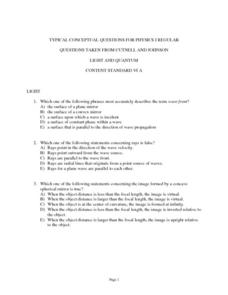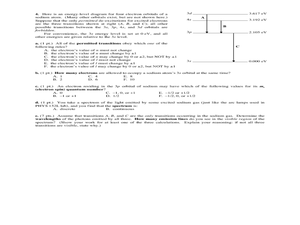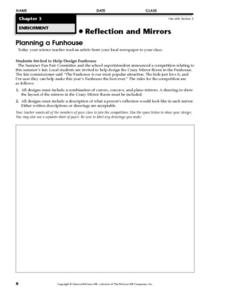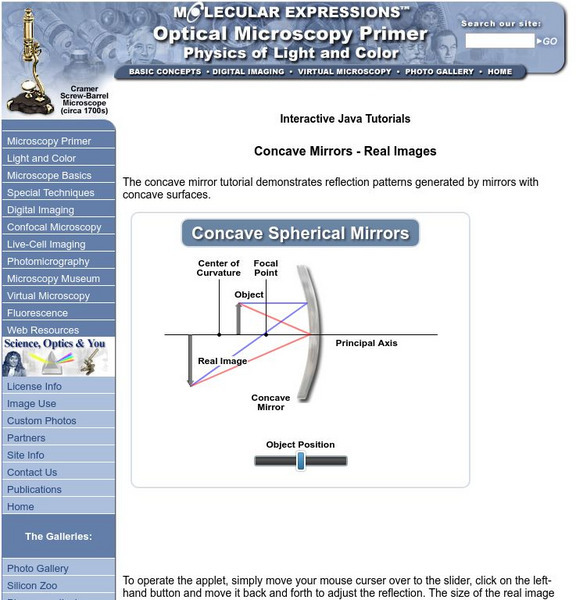Curated OER
Typical Numeric Questions for Physics I - Light and Optics
Nineteen word problems dealing with frequency, speed, reflection, and refraction of light are provided here. Empower your physics masters to manipulate equations for computing angles, focal lengths, image heights, and more! This is a...
Curated OER
Typical Conceptual Questions for Physics I - Light and Quantum
This is a stellar overview of everything light and quantum! There are 30 multiple choice questions, none of them requiring any mathematical computation. There are a few diagrams to analyze: light rays striking reflective and refractive...
Exploratorium
Touch the Spring
Concave mirrors and the images they produce are traditional topics in the physics classroom. This resource explains how to set up an investigation of them, and it provides you with the explanation of concepts.
Exploratorium
Parabolas
A parabolic mirror toy demonstrates how concave mirrors objects reflect light and produce a realistic image at their focal point. This resource probably doesn't explain any more than the printed insert that accompanies such an apparatus...
Exploratorium
Hot Spot
Not only does a concave mirror focus light waves, it can also concentrate infrared radiation into a hot spot. If you have a small electric heater and such a mirror, demonstrate this for your physical science class.
Exploratorium
Cylindrical Mirror
Using flexible mirror-like paper, physical scientists experiment with images produced by curving it and looking into its reflective surface. They find that concave mirrors cause reflected light waves to cross and actually flip the image...
Curated OER
Spherical Mirrors
Some formatting issues will need repair (a few overlapping text boxes and pictures), but overall this is a comprehensive presentation on how light reflects off of spherical mirrors. Both convex and concave mirrors are explained,...
Curated OER
Physics 152 Fall 2004 Final Exam, Parts A, B, C, D
At the end of a general physics course focused on light and electricity, you can administer this exam. Concepts covered include electromagnetism, circuits, induction, light rays, lenses and mirrors, characteristics of light, electron...
Curated OER
Planning a Funhouse
In this mirrors worksheet, students will design and draw their creation of a "Crazy Mirror Room." They must use a combination of convex, concave, and plane mirrors and they must write a description of what a person's reflection would...
Georgia State University
Georgia State University: Hyper Physics: Ray Diagrams for Mirrors
Provides a discussion of curved mirrors and ray diagrams. Shows and explains the process of drawing a ray diagram to determine the image location, size, and orientation.
Florida State University
Florida State University: Microscopy Primer: Concave Mirrors: Real Images
Florida State University offers an interactive Java applet demonstrating the object-image relationships for a concave mirror. The position of the object can be dragged along the principal axis and the location, orientation, and size of...
Florida State University
Florida State University: Light and Color: Reflection of Light
An in-depth discussion on reflection of light can be found here. Among the topics discussed include are the difference between specular and diffuse reflection, concave and convex mirrors, facets, total internal reflection, and much more....
Physics Classroom
The Physics Classroom: Lesson 3: Concave Mirrors
Lesson 3 of this tutorial on refraction is on concave mirrors. Content that is covered includes the anatomy of curved mirrors, reflection of light and image formation, ray diagrams, image characteristics for concave mirrors, plus more.
Georgia State University
Georgia State University: Hyper Physics: Mirrors in Imaging
A discussion from Georgia State University of different types of mirrors and the images which they create. Discusses different instruments which use mirrors to produce images.
Georgia State University
Georgia State University: Hyper Physics: Mirror Instruments
This site from Georgia State University discusses the means by which mirrors and lenses are combined to produce an optical instrument which accomplishes a specific purpose. Good illustrations.
Exploratorium
Exploratorium: Science Snacks: Parabolas
Recreate this optical illusion using two parabolic mirrors to make it appear like an object is in the center, when it is really just its image. This experiment requires special equipment which may need to be purchased.
Exploratorium
Exploratorium: Science Snacks: Touch the Spring
Explore the behavior of light as it reflects off a concave mirror in this optical illusion.
Science Struck
Science Struck: Parabolic Mirror: Working, Principle and Applications
Explains how a parabolic mirror works and how to calculate its geometric properties. Discusses the two forms - parabolic troughs and parabolic dishes - and how these are used in solar panels and satellite dishes. Other real-life...
Boston University
Bu: Optics: Geometric Optics
Several short descriptions of demonstrations which illustrate principles of geometric optics (many of which focus upon refraction).
Pennsylvania State University
Penn State Graduate Program in Acoustics: Reflection From Mirrors
Included here are illustrations of reflections from a plane mirror, a concave mirror and a convex mirror.
Other
Geometric Optics
This site provides a very brief definition to geometric optics, and includes links to related information.





















